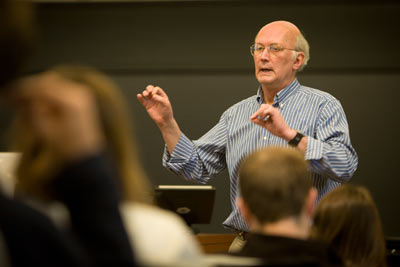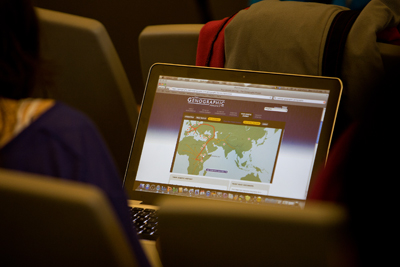New course focuses on personal genomics
By Linda B. Glaser


For less than $100 and a simple cheek swab, you can obtain a surprising amount of information about your ancestry, genetic heritage and risk factors for numerous diseases.
But the information won't help you make good medical choices for yourself or your family without an understanding of basic genomics, says Charles Aquadro, professor of molecular biology and genetics and director of the Cornell Center for Comparative and Population Genomics (3CPG).
"It's an exciting time, but it can be scary and overwhelming because the information is not made of absolutes but of probabilities," says Aquadro. "You have to understand which data is useful and how to interpret it."
This semester, Aquadro's new course, Personal Genomics and Medicine -- Why Should You Care About What's in Your Genes?, helped students navigate through the scientific, social, legal and ethical aspects of genetics, including concepts of race and ethnicity, genetic screening, personalized drugs and genetic risk factors. Spencer Wells, director of the National Geographic Society's Genographic Project and Cornell's Frank H.T. Rhodes Class of '56 Visiting University Professor, assisted Aquadro for portions of the course.
The course, which is supported by the Writing in the Majors program and was one of six University Courses offered this semester, attracted 50 students representing all seven colleges and 18 majors, ranging from communication to anthropology to hotel administration. The course was designed to help students use writing as a process of thinking, to clarify their ideas and communicate them to others. Aquadro plans to offer the course next year as well.
Aquadro adapted a model successfully used in several new biology classes by assigning the students to a small discussion section once a week, supported by a graduate student funded by the Writing in the Majors program and five additional teaching assistants who were juniors and seniors. The discussions and associated writing assignments were designed to deepen the students' understanding of the material and appreciation and respect for other perspectives on controversial issues. "It's worked out absolutely spectacularly," Aquadro says.
"Professor Aquadro has made it easy to understand and grasp really complex concepts," says Jonathan Kligman '15, a student in Cornell's Dyson School of Applied Economics and Management.
One of Aquadro's goals was to give the students real-world experience with genetics. Thanks to an anonymous donor and outreach funds from 3CPG, the students and undergraduate teaching assistants were able to participate in the Cornell Genetic Ancestry Project and learn how DNA identified the paths their common ancestors took in their different journeys from Africa.
"In some sense you get to meet your distant relatives," Aquadro says. Many in the class said the testing motivated them to discuss their results and ancestry with their parents and grandparents, an additional way the project and class reach an even broader audience.
With the cost of full genome sequencing now close to $1,000, the payoffs of personalized medicine will come at an increasing rate. For example, Aquadro wants his students to understand that many of the hundreds of deaths each year from adverse reactions to medications could be prevented if medication or doses were matched to an individual's personal genome.
But Aquadro cautions: "Genetics isn't a solution for everything, nor an absolute predictor of outcome. Scientists are still a long way from understanding how to balance all the genetic variables in a given individual. Your upbringing, environment, diet and other factors clearly contribute in complex ways to the outcome of your genetic deck of cards."
Kligman puts it more simply: "You need to understand genetic testing so you don't get scammed. This is one of the classes you have to take before you graduate."
Linda B. Glaser is staff writer for the College of Arts and Sciences.
Media Contact
Get Cornell news delivered right to your inbox.
Subscribe